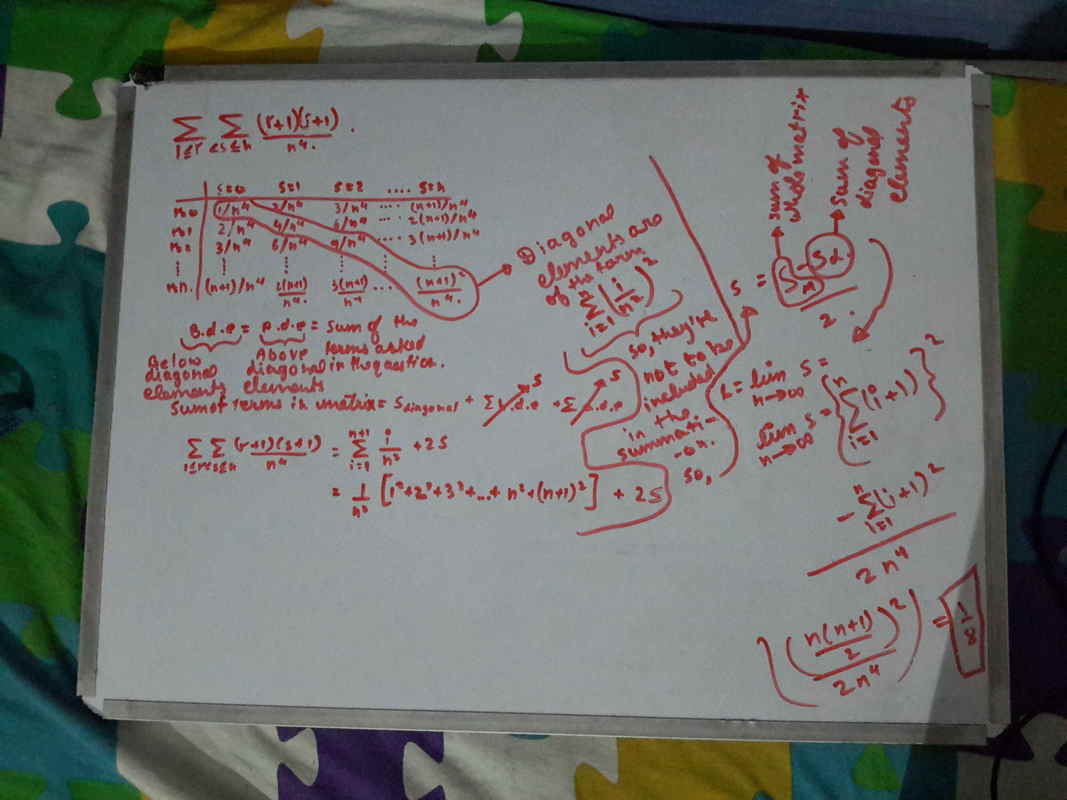Sequential limit
Find the value of n → ∞ lim n 4 1 ≤ i < ∑ j ≤ n ∑ ( i + 1 ) ( j + 1 )
If you're looking to skyrocket your preparation for JEE-2015, then go for solving this set of questions .
This section requires Javascript.
You are seeing this because something didn't load right. We suggest you, (a) try
refreshing the page, (b) enabling javascript if it is disabled on your browser and,
finally, (c)
loading the
non-javascript version of this page
. We're sorry about the hassle.
2 solutions
Thank you Deepanshu for such a wonderful solution. keep it up. ⌣ ¨
Nice man, that was a good way, my method was to fix an 'i' sum for all 'j' and then subtract the extra term (where i=j) and then go,
@Deepanshu Gupta I think there is a typo in the final step..Instead of n ( n + 1 , it should be n ( n + 3 )
Great Solution Using Matrix in such a beautiful way is truly remarkable!!!
could someone explain how Aij=(i+1)(j+1)
Here is my approach to this problem

Really a very nice solution. Thumbs up 👍
Awesome bro
Let our required Limit as " L " . Also Consider an n × n matrix , Such that a i j represent element of i th row and j th column. Also let a i j = ( i + 1 ) ( j + 1 ) .
Again let, S 1 = i > j ∑ n a i j ≡ i > j ∑ n ( i + 1 ) ( j + 1 ) S 2 = i < j ∑ n a i j ≡ i < j ∑ n ( i + 1 ) ( j + 1 ) S 3 = i = j ∑ n a i j = i = 1 ∑ n a i i ≡ i = j ∑ n ( i + 1 ) ( j + 1 ) ≡ i = 1 ∑ n ( i + 1 ) 2 S = S 1 + S 2 + S 3 = i = 1 ∑ n j = 1 ∑ n ( i + 1 ) ( j + 1 ) ≡ ( i = 1 ∑ n ( i + 1 ) ) 2
So Our Target is to calculate S 2 = ? , But Since due to symmetrical distribution in matrix , S 2 = S 1 ≡ 2 S − S 3 .
L = n → ∞ lim S 2 = n → ∞ lim ( 2 n 4 ( ∑ i = 1 n ( i + 1 ) ) 2 − ∑ i = 1 n ( i + 1 ) 2 ) L = n → ∞ lim ( 2 n 4 ( ∑ i = 1 n ( i + 1 ) ) 2 − 0 ) = n → ∞ lim ⎝ ⎜ ⎜ ⎜ ⎜ ⎜ ⎛ 2 n 4 ( 2 n ( n + 1 ) ) 2 ⎠ ⎟ ⎟ ⎟ ⎟ ⎟ ⎞ L = 8 1